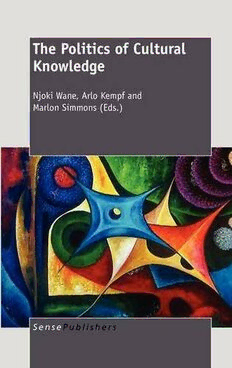Download The Politics of Cultural Knowledge PDF Free - Full Version
Download The Politics of Cultural Knowledge by Njoki Wane, Arlo Kempf, Marlon Simmons in PDF format completely FREE. No registration required, no payment needed. Get instant access to this valuable resource on PDFdrive.to!
About The Politics of Cultural Knowledge
The advent and implementation of European colonialism have disrupted innumerable epistemological geographies around the globe. Countless cultural ways of knowing and local educational practices have in some way been displaced and dislocated within the universalizing project of the Euro-Colonial Empire. This book revisits the colonial relations of culture and education, questions various embedded imperial procedures and extricates the strategic offerings of local ways of knowing which resisted colonial imposition. The contributors of this collection are concerned with the ways in which colonial education forms the governing edict for local peoples. In The Politics of Cultural Knowledge, the authors offer an alternative reading of conventional discussions of culture and what counts as knowledge concerning race, class, gender, sexuality, identity, and difference in the context of the Diaspora. In The Politics of Cultural Knowledge, Wane, Kempf and Simmons have put together a much-needed reader that could achieve the critical reconstructions for the timely re-voice-ing of anti-colonial and Indigenous knowledge systems that introspectively and deeply mediate the lives of people. It is a comprehensive, multi-locational, well-structured work that should represent an important milestone in harnessing the long-awaited inclusive epistemological platforms that must teach, empower and inspire those who seek different cultural ways of knowing. The Politics of Cultural Knowledge should immensely benefit students and researchers in the social sciences, education and those in cultural, and linguistic studies. Ali A. Abdi, PhD, Professor & Co-Director, Centre for Global Citizenship Education and Research (CGCER) Department of Educational Policy Studies Faculty of Education, University of Alberta
Detailed Information
| Author: | Njoki Wane, Arlo Kempf, Marlon Simmons |
|---|---|
| Publication Year: | 2011 |
| ISBN: | 9789460914799 |
| Pages: | 178 |
| Language: | English |
| File Size: | 0.834 |
| Format: | |
| Price: | FREE |
Safe & Secure Download - No registration required
Why Choose PDFdrive for Your Free The Politics of Cultural Knowledge Download?
- 100% Free: No hidden fees or subscriptions required for one book every day.
- No Registration: Immediate access is available without creating accounts for one book every day.
- Safe and Secure: Clean downloads without malware or viruses
- Multiple Formats: PDF, MOBI, Mpub,... optimized for all devices
- Educational Resource: Supporting knowledge sharing and learning
Frequently Asked Questions
Is it really free to download The Politics of Cultural Knowledge PDF?
Yes, on https://PDFdrive.to you can download The Politics of Cultural Knowledge by Njoki Wane, Arlo Kempf, Marlon Simmons completely free. We don't require any payment, subscription, or registration to access this PDF file. For 3 books every day.
How can I read The Politics of Cultural Knowledge on my mobile device?
After downloading The Politics of Cultural Knowledge PDF, you can open it with any PDF reader app on your phone or tablet. We recommend using Adobe Acrobat Reader, Apple Books, or Google Play Books for the best reading experience.
Is this the full version of The Politics of Cultural Knowledge?
Yes, this is the complete PDF version of The Politics of Cultural Knowledge by Njoki Wane, Arlo Kempf, Marlon Simmons. You will be able to read the entire content as in the printed version without missing any pages.
Is it legal to download The Politics of Cultural Knowledge PDF for free?
https://PDFdrive.to provides links to free educational resources available online. We do not store any files on our servers. Please be aware of copyright laws in your country before downloading.
The materials shared are intended for research, educational, and personal use in accordance with fair use principles.

